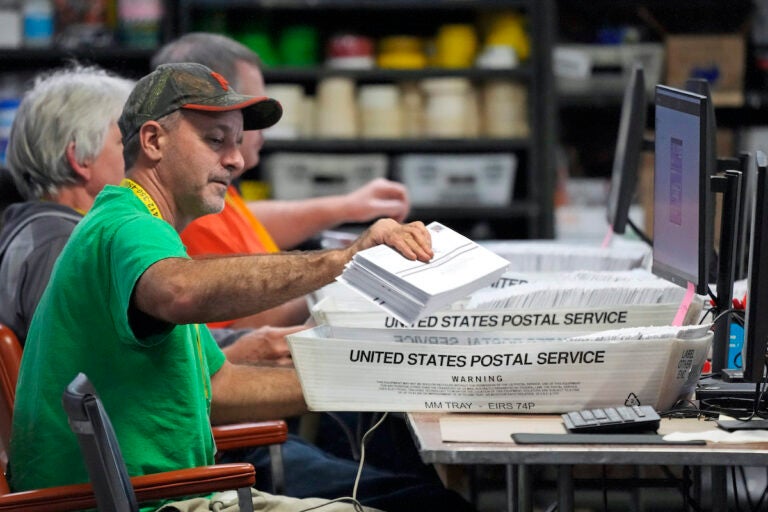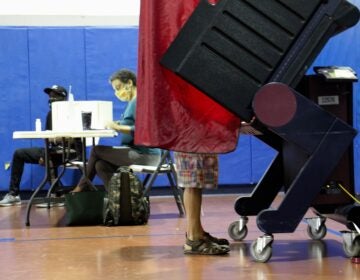Outcome of Pa. mail voting case may impact 2024 election
The case may have ramifications for the upcoming 2024 presidential election, as Democrats in Pennsylvania historically vote by mail by far wider margins than Republicans.
Listen 1:10
A federal appeals court must decide if Pennsylvania voters who put the wrong date on the envelope containing their mail-in ballots should have their votes thrown out. The case argued Tuesday, Feb. 20, 2024, in Philadelphia could be significant in this year’s presidential contest. (AP Photo/Gene J. Puskar, File)
From Philly and the Pa. suburbs to South Jersey and Delaware, what would you like WHYY News to cover? Let us know!
During the 2022 midterms, more than one million voters dropped their ballots in the mail, well in time for them to be counted by Election Day. Several thousand of them were rejected without notice, due to what critics have called a minor “paperwork error.”
Pennsylvania voting law requires residents who vote-by-mail to hand write the date they filled out and dropped their ballot in the mailbox on the outside of the envelope. The issue has become a federal case with Republicans and voter advocates asking the U.S. Third Circuit Court of Appeals to decide whether Pennsylvania voters must write accurate mailing dates for their ballots to be accepted- even when the ballot arrives by deadline.
The case — Pennsylvania State Conference of NAACP Branches v. Northampton County Board of Elections — may have ramifications for the upcoming 2024 presidential election, as Democrats in Pennsylvania historically vote by mail by far wider margins than Republicans. For example, in 2022, Sen. John Fetterman received over 726,000 more mailed votes than his opponent Dr. Mehmet Oz.
Though limited before 2019, mail-in voting significantly expanded throughout the pandemic and more voters took advantage of the opportunity to avoid standing in long lines on Election Day.
In 2022, the Republican National Committee, Republican National Congressional Committee, and Pennsylvania Republican Party, petitioned the state Supreme Court to prohibit the counting of undated and wrongly dated mail-in ballots. The court obliged and several thousand votes were not counted, among more than the one million that were mailed.
However, the Pennsylvania State Conference of NAACP Branches then sued, arguing that the date is “immaterial” if it arrives by the deadline. The U.S. District Court agreed, but the Republican groups then appealed to the Third Circuit.
The appeals court will likely decide the case based on whether the date is “material” to the validity of the ballot, guided by voting rights as laid out by the Civil Rights Act. The Materiality Provision of the 1964 law says that election officials cannot “deny the right of any individual to vote in any election because of an error or omission on any record or paper relating to any application, registration, or other act requisite to voting, if such error or omission is not material in determining whether such individual is qualified under State law to vote in such election.”
John Gore, lawyer for the Republican groups, told the court voters have a right to vote but that the date is required to help election workers determine the ballot’s validity. Therefore, he argued, voters must follow the rules.
“The right’s not denied when election officials … declined to count the ballot because the individual did not in fact take all action necessary to make the ballot effective,” he said.
However, Ari Savitzky of the ACLU who argued on behalf of the NAACP, disagreed, calling such mistakes “a meaningless paperwork error.”
The date “is not used for anything having to do with determining a voter’s qualifications,” he told the justices. “It’s not used to determine their identity. It’s not used to determine whether they voted on time.”
The League of Women Voters, Common Cause, the Black Political Empowerment Project and other groups joined the NAACP, in the suit.
It is unknown whether the court will render a decision in time for the presidential election this Tuesday, Nov. 5.
WHYY is your source for fact-based, in-depth journalism and information. As a nonprofit organization, we rely on financial support from readers like you. Please give today.







